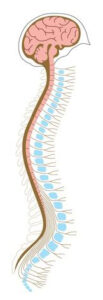When we can move beyond fear into curiosity, we find that illness is the body’s wisdom playing out in its own highly designed and incredibly personal way.
he labels: Depression. Pertussis. Breast cancer. Hashimoto’s. These are more than words— these are modern-day hexes. They have this power because culturally supported beliefs give meaning to our perception of these observed signs and symptoms. We create that meaning as a collective, and then we pass it on and around. We decide, together, what we will be afraid of. The list is curated and maintained by the media, and we are continuously learning and relearning when—and around what to activate this fear response.
What is an anxiety disorder? Why is worrying a problem?
Does worry really make us sick?
Enter the nocebo effect.
Perhaps you’ve heard of the placebo effect, which is when we’re “tricked” into feeling better by a sugar pill. Nocebo is the opposite, and it loosely translates to being “harmed by expectations.” But there is typically no sugar pill involved— just the power of belief. This phenomenon is called “expectancy” in the medical literature; for example, when subjects are told that they might be randomized to a sugar pill in a trial of a popular medication like Prozac, this belief can cause a complete loss of reported benefits, even for those patients not on the sugar pill. Interestingly, it seems that males’ responses depend more strongly on information given about placebo (a.k.a. intellect-driven responses), whereas women are more sensitive to conditioned responses (a.k.a. felt responses) in the context of nocebo. That is, female study subjects who merely witnessed another female reporting side effects from a medication were twice as likely to experience these side effects from a sugar pill/sham medication. This is referred to as “social modeling.” So if our culturally conditioned beliefs about harm and vulnerability can influence our physiology, then how do we understand this bodily response? Is the body just easily tricked, or is it responding intelligently to what we perceive as a conflict, distress, or danger? Could an experience of fear actually be what seeds the symptoms ultimately diagnosed as disease?
Ignoring the Root Cause
If we perceive fear-inducing distress in life, it likely stems from our pre-existing wounds. Psychotherapist Francis Weller has categorized these wounds as isolation, loss, shame, separation from nature, and even the inheritance of family baggage. When we carry this grief, it colors our experiences and informs our personal alarm systems. And, perhaps, this grief tells our bodies when and how to respond with symptoms. Once that response is underway, then we are invited to respond again to the symptoms themselves. Do we freak out and run to the ER? Or do we embrace the symptoms?
My teacher, Swaranpal, saw a shaman recently and had a transformative experience. The next day, she developed a fever and left me a message, from her bed, about how awesome it was that her body was processing the psychospiritual shift. A fever can, in fact, be awesome, through the lens of appreciation for bodily wisdom.
Translating Emotions to the Body
This isn’t really news. The scientific discipline of psychoneuroimmunology has been around since the 1990s, telling us of a connection between the immune system, the psyche, and the brain. NIH researcher Candace Pert, Ph.D., discoverer of the opiate receptor, was one of the first to legitimize that emotions encode in the body, a notion that could so easily be dismissed by the “body as machine” model of medicine that has dominated the past 300 years. This is one of the theories around how and why emotional releases and inexplicable healing can occur through yogic technology, such as kundalini yoga, that involves repetitive self stimulation of certain body regions.
And this is why my greatest advocacy is to orient you around the story that speaks your truth. If you believe that challenges—and even adversity—hold a meaning, that the body has an innate wisdom, and that the cosmos operates under the principles of an elegant design, then you bend and flow with what comes. You bring curiosity to bear. And you live a life that is emergency-free.
Schedule an Appointment - We are here to help you!
Overland Park, KS Clinic
6701 W. 121st Street | Suite 200
Overland Park, KS 66209
913-643-1771
913-643-1775
Olathe, KS Clinic
10454 S. Ridgeview Rd.
Olathe, KS 66061
913-689-2333
913-689-2334
Prairie Village, KS Clinic
4121 W. 83rd St. | Suite 147
Prairie Village, KS 66208
913-490-4444
913-490-4445
Raytown, MO Clinic
10803 E State Rte 350 | Suite B
Raytown MO 64138
816-356-9313
816-425-2117
Lee's Summit, MO Clinic
338 Southwest Main St.
Lee's Summit, MO 64063
816-600-5483
816-524-5328
Belton/Raymore, MO Clinic
17027 Bel-Ray Blvd.
Belton, MO 64012
816-425-7015
816-425-2117
Blue Springs, MO Clinic
622 SW US 40 Hwy
Blue Springs, MO 64014
816-815-7007
816-815-7008
Liberty, MO Clinic
1520 N. Church Rd | Suite C
Liberty, MO 64068
816-831-3600
816-831-3601









